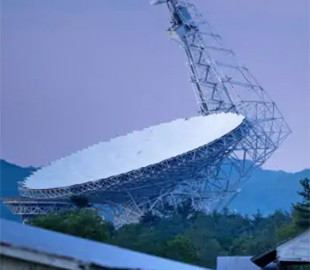
The town of Green Bank has no no cell tower. And electromagnetic silence in this area is protected by the federal government.
In a world where Wi-Fi and cell towers are everywhere, people with increased sensitivity to electromagnetic waves began to appear. But for them there is a place where they can feel quite comfortable. The area in West Virginia, home to the world's largest manned telescope, is in complete electromagnetic silence. The Washington Post writes about this special place.
In the 1950s, the federal government bought up the farmland to build the Green Bank Observatory. It is now home to the Robert C. Byrd Green Bank Radio Telescope, the largest manned telescope in the world weighing 7,600 metric tons and standing 148 meters tall. Its dish can study quasars and pulsars, asteroids and planets, as well as look for evidence of extraterrestrial life.
The observatory's equipment is so sensitive that Earth's radio waves will interfere with their astronomical research, the way a scream (a bunch of WiFi signals) drowns out a whisper (the signals of hydrogen clouds hanging between galaxies). So in 1958, the Federal Communications Commission established the National Radio Silence Zone, a 13,000-square-mile area covering areas of both Virginia and West Virginia where radio transmissions are restricted to varying degrees.
At the center of the observatory is 16 – kilometer zone where Wi-Fi, mobile phones, cordless phones and many other types of equipment that emit waves are prohibited.
Wired Internet is OK, as are TVs — although you must have a cable or satellite provider. This is not a 100-year-old place. More like 30 years ago. If you want to schedule a meeting with someone, you do so in person.
Who Lives in Green Bank
Some people move here to work at the observatory. Others come because they feel they have to. These are “electrosensitive”, as they often call themselves. They are sick, and Green Bank — their Lourdes (a city in France where the Virgin Mary is believed to have appeared to the girl Bernadette. A place of pilgrimage, — ed.).
Experts assume that in Pocahontas County, which has a population of approximately 7,500 people , there are at least 75 people with electromagnetic hypersensitivity.
One of them is Brandon Barrett, who arrived here two weeks ago. He was a racer and owned a motorcycle shop in Buffalo, but in 2019 he started getting sick. He realized that his condition was directly related to the cell tower not far from his house. In the summer of 2023, when what appeared to be blood-like fluid began to ooze from his ears, Brandon noticed that new rows of panels had appeared on the cell tower. He moved to the countryside, he got better, but not much. Then he decided to move to Green Bank.
200% Deposit Bonus up to €3,000 180% First Deposit Bonus up to $20,000He read that other sick people had moved here and got better, and that the electromagnetic silence in the area was protected by the federal government.
Sue Howard, 63, who has lived in Green Bank since 2016, helps the new arrivals. She moved from New York when she started suffering from migraines, heart arrhythmia and temporary blindness.
They have heard that there is no real scientific consensus on their disease, although they point out that Sweden recognizes electrohypersensitivity (EEH) as a functional disorder — although a self-reported condition. They watched journalists discredit doctors and scientists who support the idea of EHR. And, no, they don't like the caricature of electrosensitivity depicted on the TV show “Better Call Saul”: a deranged, paranoid person who wraps himself in a tinfoil blanket and avoids even sunlight.
How people with electromagnetic hypersensitivity live
For groceries, they go to Cass, a town almost 11 km away, where there are shops, restaurants and a gas station with Wi-Fi. Or in Elkins, 80 km north of Green Bank.
“It's like driving into a brick wall,” — says Sue of her trips there. The symptoms start to show again and it takes several days for her to regain consciousness. With no cell service, Green Bank residents have to rely on landlines just like we all did 30 years ago.
“You're so isolated from civilization. You don't go to the movies anymore. You don't really go to restaurants. You don't hang out with your friends from home. It's very difficult,” says Audra Bogachyk, a former dental hygienist in her late 50s who moved here from Pittsburgh to treat nosebleeds and other symptoms. When Brandon arrived homeless, Audra and her father put him up in a house made of shipping containers at their unpowered camp deep in the woods on a mountaintop. He's still deciding where to settle and wants to build a cabin in the woods.Sue builds two houses on a large plot of land, far from other people: one with electronics so that her husband can still enjoy the benefits of modern life, and one isolated from them. “The idea is to create a quiet zone within a Quiet Zone,” — she says.
But there is a danger that Green Bank will soon cease to be a haven for hypersensitive people. Recently, the commissions of the eight Quiet Zone counties passed resolutions expressing concern that the zone impedes public safety. They say limited cell and Wi-Fi service is slowing down communications between rescuers and could put lives at risk throughout the 13,000-square-mile area. And insensitive Green Bank residents continue to install Wi-Fi even though they're not allowed to.
“I don't blame the locals for wanting it,” — says Sue. At the same time, she adds: “This is a matter of human rights. We have the right not to have our body subjected to this penetration.”

